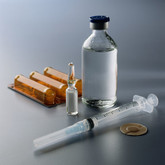Biosimilars
Bevacizumab ‘similar biologic’ Versavo launched in India
India-based generics manufacturer Dr Reddy’s Laboratories (Dr Reddy’s) announced on 19 August 2019 that it had launched its bevacizumab ‘similar biologic’, Versavo (DRZ_BZ) in India.
Clinical data requirements for biosimilars in the EU: PK and PD comparability
In their article [1], authors from the Paul-Ehrlich-Institut, the European Medicines Agency (EMA) and the Federal Institute for Drugs and Medical Devices (BfArM), discussed the totality of evidence approach for biosimilars in the European Union (EU) using case studies to illustrate biosimilars for which differences were observed in different parts of the comparability exercise and on the justification for why these differences did not preclude regulatory approval.
EMA approval for Pegfilgrastim Mundipharma
The European Medicines Agency’s (EMA) Committee for Medicinal Products for Human Use (CHMP) announced on 18 October 2019 that it had recommended granting of a marketing authorization for the pegfilgrastim biosimilar Pegfilgrastim Mundipharma.
Positive real-world data for etanercept biosimilar Benepali
Korea-based Samsung Bioepis (Samsung and Biogen’s joint venture) announced on 9 October 2019 that it had presented positive real-world data from its etanercept biosimilar Benepali at the 2019 European Academy of Dermatology and Venereology (EADV) Congress [1].
Clinical data requirements for biosimilars in the EU: analytical comparability
For biosimilars, the regulatory review process is based on the totality of evidence generated in support of biosimilarity.
Russian approval for non-originator dornase alfa
Russian biotechnology company Generium and Swiss-based cell-line producer Selexis announced on 17 September 2019 that the Russian Ministry of Health had approved their dornase alfa non-originator biological drug, Tigerase. The drug is a non-originator biological of Roche’s Pulmozyme (dornase alfa).
Celltrion and Juno make biosimilars deal in Australia and Herzuma launches in Iraq
South Korean biotechnology company Celltrion Healthcare (Celltrion) has entered into a partnership with Juno Pharmaceuticals (Juno) to market the trastuzumab biosimilar Herzuma and rituximab biosimilar Truxima in Australia. The company also launched Herzuma in Iraq.
Trial of bevacizumab copy biological with novel antibody targeting PD-1
China-based Shanghai Henlius Biotech (Henlius) is recruiting patients for a study that will investigate a proposed bevacizumab copy biological in combination with a novel antibody targeting PD-1.
Clinical data requirements for biosimilars in the EU
In their article [1], authors from the Paul-Ehrlich-Institut, the European Medicines Agency (EMA) and the Federal Institute for Drugs and Medical Devices (BfArM) discussed the clinical data requirements for biosimilars in the European Union (EU).
FDA approves Pfenex’s follow-on teriparatide product
US-based biotech firm Pfenex announced on 7 October 2019 that it had received approval from the US Food and Drug Administration (FDA) for its follow-on teriparatide product (PF708).













